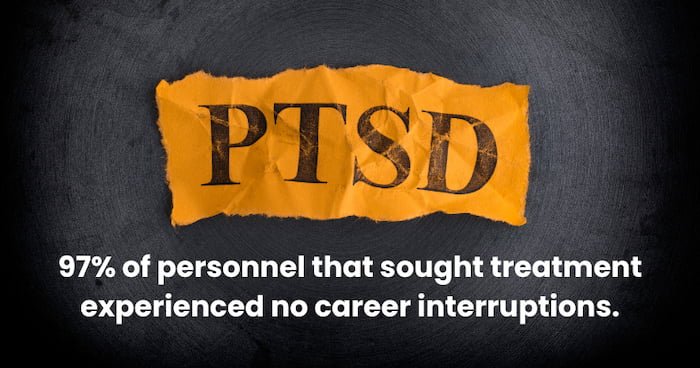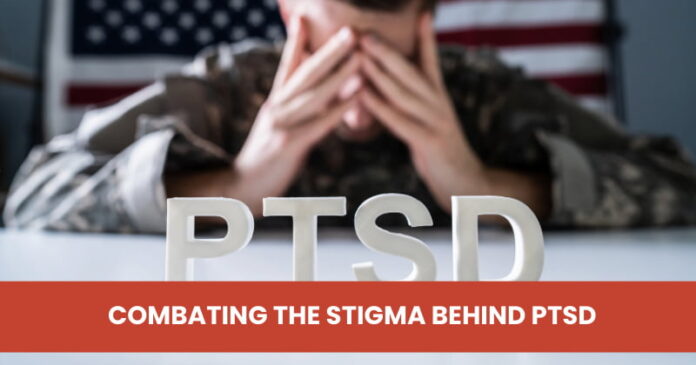PTSD and mental health issues in veterans are severely underreported. Why? Stigma. Dealing with PTSD and mental health issues is a profoundly personal and scary experience. Those who have experience with this often feel isolated and alone. These feelings contribute to the stigma surrounding mental health.
For years, these disorders have been misunderstood, mischaracterized, and the behavior of people with PTSD and mental health disorders is often misinterpreted. In recent years, the mental health and veteran communities have developed a strong partnership to break down barriers and reduce stigma.
This article will discuss the signs and symptoms of PTSD, the stigma surrounding PTSD and mental health in veterans, the efforts being taken to reduce stigma in the veteran community, and how you can help.

What is PTSD?
PTSD, otherwise known as Post Traumatic Stress Disorder, can develop due to exposure to a traumatic event. It presently impacts between 11-20% of the veteran population. Undiagnosed and untreated, PTSD can last months, if not years. Symptoms of PTSD and other mental health disorders can manifest in various ways. Some of the most common include:
● Intrusive Memories
● Avoidance
● Negative mood swings
● Physical or emotional detachment
● Suicidal thoughts or ideations
In addition to symptoms manifesting in multiple ways, PTSD and other mental health disorders can take weeks or months to manifest after witnessing a traumatic event. PTSD and mental health disorders are not one-size-fits-all.
If you or someone you know has witnessed a traumatic event, it’s important to keep an eye out for any symptoms so you can seek the help you need or encourage your loved one to seek the help they need to get better. PTSD and many other mental health disorders that result from service are treatable!
The Stigma Surrounding Veterans with PTSD and Mental Health Disorders
The stigma surrounding PTSD and mental health issues is one of the contributing factors to veteran suicide. Stigma is a mark or characteristic of disgrace associated with a particular circumstance, quality, or person.
Those suffering or confined by stigma can suffer from stereotyping, bullying, harassment, isolation, discrimination, and limited access to employment and community-centric activities.
Specifically, in the military, where strength, toughness, and mental clarity are revered. It can be scary to seek treatment and help for PTSD and mental health disorders that are seen as “weak” or “dangerous.” Many veterans face something called self-stigma rather than community-induced stigma.
Self-stigma occurs when an individual holds demeaning or degrading beliefs about a particular trait or characteristic and accepts that others hold the same belief. Self-stigma is one of the biggest aspects working against veterans and military members with PTSD and mental health disorders.

Another aspect of self-stigma among military personnel and veterans is the belief that reporting PTSD and mental health disorders could lead to unemployment. Guess what? In 2006, a study found that 97% of personnel who sought treatment experienced no career interruptions. Self-stigma strikes again!
Fighting stigma starts from within ourselves and spreads to the larger community.
Reducing Stigma in the Veteran Community
The Department of Veterans Affairs and many non-profit veteran groups have worked tirelessly to reduce the stigma surrounding PTSD and mental health disorders. Two larger programs include the Salute to Recovery Program and the Community Care Program.
Both programs are geared toward connecting veterans and military personnel with resources to address PTSD and mental health disorders and actively fighting stigma with information and research.
Those are just some of the two programs available to help veterans and help fight stigma. We encourage all veterans and military personnel suffering or wanting to join the cause to fight stigma to reach out to their local VA offices.

You can also fight stigma within yourself and do the work of fighting stigma in your immediate circles and local community with some of the following methods:
● Spread accurate information and ignore misinformation. Spread and communicate information from reliable sources such as VA.gov and other scientific studies and resources.
● Connect others to or build a community of supportive individuals. Community is key! When you have supportive people around you or can connect someone struggling with a supportive community will help so much on the road to recovery!
● Practice mindfulness exercises and actively fight self-stigma. PTSD and mental health disorders do not define you or your loved ones. Fighting self-stigma is the first and largest step we can take to fight the stigma around PTSD and mental health in veterans and military personnel!
If we work as a community to combat the stigma faced by military personnel and veterans, we can continue to improve the lives of those who have sacrificed for this country. For local resources, reach out to your local VA office.
Read Also
- The Role of Ingredients in Your Skincare: What to Look ForSkincare works best when you understand what goes into the products you use daily. Ingredients form the foundation of every formula and determine how the skin reacts over time. Each cream, cleanser, or serum has its own role, determined by its ingredients. Learning what to look for helps you pick products that help skin and… Read more: The Role of Ingredients in Your Skincare: What to Look For
- Your Guide to Finding a Trusted DentistChoosing the right dentist in Sandgate or your area is crucial for maintaining good oral health and achieving a confident smile. With countless dental practices to choose from, patients may find the task daunting. Data from the American Dental Association indicates that there are over 200,000 practicing dentists in the United States, highlighting the importance… Read more: Your Guide to Finding a Trusted Dentist
- Mastery Forge Webinar Platform – Choose Your WebinarWe live in a time when knowledge is literally at your fingertips. You no longer have to go on long courses, wait for free places or adapt to a rigid schedule of classes. All you need is the Internet, a little willingness and you have access to training courses conducted by experts from all over… Read more: Mastery Forge Webinar Platform – Choose Your Webinar
- Transforming Patient Care with Professional Healthcare Transcription ServicesIn today’s fast-paced healthcare environment, the need for precise and timely documentation cannot be overstated. Accurate documentation is not merely an ancillary task; it is a core element of delivering high-quality patient care. The ability to maintain compliance with regulations, enhance operational efficiency, and ensure the integrity of patient records has never been more critical.… Read more: Transforming Patient Care with Professional Healthcare Transcription Services
- Achieving a Defined, Balanced Facial Contour in SingaporeA well-defined jawline and a gently tapered lower face — commonly referred to as a V-shaped face — is a look many people aspire to. In Singapore’s beauty and aesthetic scene, treatments that help refine facial contours have grown in popularity as more individuals seek subtle, natural enhancements that boost confidence and balance facial features.… Read more: Achieving a Defined, Balanced Facial Contour in Singapore
- Beyond the Blueprint: Why Integrated Electronics Manufacturing Beats Fragmented SourcingBringing an electronic product to market is a complex orchestration of design, engineering, manufacturing, and logistics. The days of siloed operations, where a company would design a product and then simply hand off the blueprints to a contract manufacturer, are largely disappearing. In their place, a more integrated and efficient model has emerged: end-to-end electronics… Read more: Beyond the Blueprint: Why Integrated Electronics Manufacturing Beats Fragmented Sourcing







